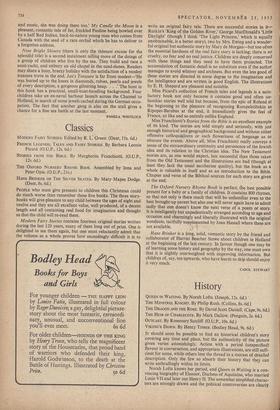Classics
MODERN FAIRY STORIES. Edited by R. L. Green. (Dent, I Is. 6d.)
PEOPLE who must give presents to children this Christmas could do much worse than remember these five books. The three story- books will give pleasure to any child between the ages of eight and twelve and they are all excellent value, well produced, of a decent length and all containing real food for imagination and thought so that the child will re-read them.
Modern Fairy Stories contains fourteen original stories written during the last 120 years, many of them long out of print. One is delighted to see them again, but one must reluctantly admit that the volume as a whole proves how exceedingly difficult it is to write an original fairy tale. There are successful stories in it- Ruskin's 'King of the Golden River,' George MacDonald's 'Little Daylight' (though I think 'The Light Princess,' which is equally unobtainable, is .a better story), two by Mrs. Ewing and a wonder- ful original but authentic story by Mary de Morgan—but too often the essential hardness of the real fairy story is lacking; there is no cruelty, no fear and no real justice. Children are deeply concerned with these things and they need to have them projected. The accumulation of fantastic detail is no substitute even if the author manages to avoid whimsy and archness. But even the less good of these stories are directed in some degree to the imagination and the intelligence and are written in good English. The illustrations by E. H. Shepard are pleasant and suitable.
Miss Picard's collection of French tales and legends is a satis- factory book not only because it contains good and often un- familiar stories well told but because, from the epic of Roland at the beginning to the pleasure of recognising Rumpelstiltskin as Ripopet-Barabas at the end, it immediately gives the feel of France, so like and so entirely unlike England.
Miss Franchiotti's Stories from the Bible is an excellent example of its kind. The stories are told simply and seriously, with just enough historical and geographical background and without either offensive colloquialisms or such floweriness of language as to obscure the events. Above all, Miss Franchiotti really conveys a sense of the extraordinary continuity and persistence of the Jewish idea and its relation to the Christian idea. The New Testament stories are, as one would expect, less successful than those taken from the Old Testament and the illustrations are bad (though at least they lack the usual saccharine quality), but the book as a whole is valuable in itself and as an introduction to the Bible. Chapter and verse of the Biblical sources for each story are given at the end.
The Oxford Nursery Rhyme Book is perfect, the best possible present for a baby or a family of children. It contains 800 rhymes, so that not only is there much that will be unfamiliar even to the best brought-up parent but also one will never again have to admit sadly that one doesn't know the next verse of a poem or story. It is intelligently but unpedantically arranged according to age and occasion and charmingly and liberally illustrated with the original woodcuts, tactfully supplemented by Joan Hassall where these are not available.
Hans Brinker is a long, solid, romantic story by the friend and collaborator of Harriet Beecher Stowe about children in Holland at the beginning of the last century. In favour though one may be of learning some history and geography by the way, one must own that it is slightly overweighted with improving information. But children of, say, ten upwards, who have learnt to skip should enjoy it very much.
CAROL STEWART


























































 Previous page
Previous page